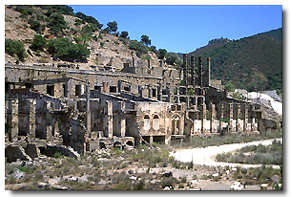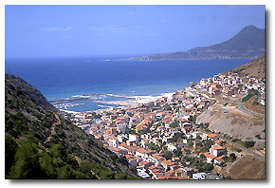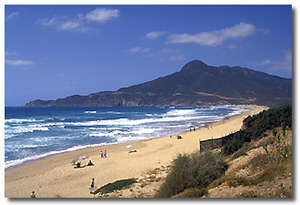The impression is that of entering another world.
The history of Ingurtosu — the rich mining vein is said to have been discovered by a smith
from Arbus —is indisputably linked to Lord Brassey, the noble Englishman owner of the "
Pertusola" company, who in 1900 allowed the construction of "Laveria of Naracauli",
at that time a real jewel of technology. Lord Brassey died tragically. He was run over by a carriage
in London and in his memory a monument in front of the little church of the mining center was erected
in a beautiful position that looks towards the Mediterranean Sea.
|

 Naracauli - Brassey washing plant Naracauli - Brassey washing plant |
|
On the other hand the epoch of
the mines in Sardinia intertwines with the histories of some famous characters who tried to make
their fortune in Sardinia exploiting the lead, zinc and silver veins which abounded in the mountains.
The French writer Honoré de Balzac launched into an unlikely business adventure in order to
try to get out of debt.
|
Or the family of the painter Amedeo Modigliani, who was given great deal
of help to obtain the concession in Buggerru and also of Henry Hoover, an unknown industrial
director, who stayed in the province of Nuoro to run a copper mine before becoming president of
the USA. Histories of brave or unlucky entrepreneurs, histories of thousands of men who used to
work in the darkness of the galleries, often in inhumane conditions, in order to earn their daily
crust.
|
|

 Buggerru Buggerru |

 The beach of Buggerru The beach of Buggerru |
|
While if Ingurtosu has the charm of an unspoiled natural setting and of the silence of a
deserted landscape, Montevecchio, which is in the territory of Guspini, is the biggest mine.
It includes more then 100 kilometers of galleries, the deepest mine shaft (350 meters) and the
largest open-air laveria which was built in 1877. Discovered last century by a priest, Montevecchio
is the most imposing and the best preserved mine in Italy because it was closed only few years ago.
|
|